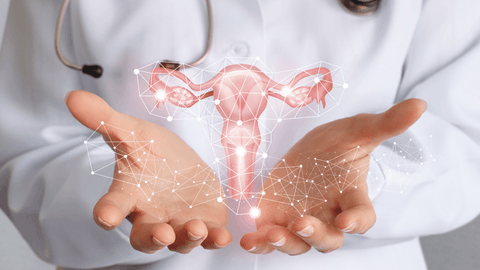Enlarged Uterus - Symptoms, Causes and Diagnosis
The uterus is a small, muscular female reproductive organ responsible for keeping and nourishing the foetus until it is ready for birth. An enlarged uterus is a condition in which the uterus grows in size than it is supposed to be. This condition can be severe, can affect fertility and can lead to abnormal uterine bleeding.

What is Enlarged Uterus?
An enlarged uterus is the generalised swelling of the uterine wall. This means the uterine size is above the average size of a uterus. A woman's uterus is responsible for holding the foetus and providing nourishment until the baby is born. The uterus is shaped like an upside-down pear and is roughly the size of a fist. The standard dimensions of the uterus are around 3 to 4 inches by 2.5 inches. During pregnancy, the uterus can swell to accommodate a growing fetus. However, enlarged uterus doesn't provide health complications, but can affect fertility.
Symptoms of Enlarged Uterus
There is a list of common symptoms of the enlarged uterus:
- Heavy bleeding during periods;
- Bloating;
- Pain abdomen during menses;
- Heaviness in the lower abdomen;
- Difficulty in conceiving;
- Miscarriage or premature delivery;
- Swelling and cramping in the legs;
- Pain during sexual intercourse;
- Frequent urination
- Acne;
- Excessive or unwanted hair growth;
- Constipation;
- Vaginal discharge;
- Weight gain;
- Hormonal changes;
- Infertility problems.
If a woman experiences any of these symptoms, she must contact her healthcare provider for getting a treatment plan and medical advise.
Causes of Enlarged Uterus
It can be found in the lower abdomen or the pelvic region in reproductive age group women, while a bulky mass may be present. Because of that, women are encouraged to receive routine check-ups by their gynaecologists.
Several factors can cause the uterus to enlarge. The most common and known causes are:
Polycystic Ovarian Syndrome or PCOS
A medical condition called Polycystic Ovarian Syndrome (PCOS) is an imbalance of hormones that can cause the uterus to grow. It's diagnosed when a woman has irregular periods and bleeds during her menstrual cycle.
Ovarian Cysts
Sometimes, ovarian cysts will never cause any symptoms. If they do, cysts can trigger abdominal pain, bloating and nausea; irregular menstruation; pelvic pain; an enlarged uterus; back pain; heavy menstrual bleeding; inflammation of the uterus.
Endometrial Cancer
Cancers of the uterus can lead to a bulky uterus in older women, as reported by the USA's National Cancer Institute (NCI). This is found to be one of the symptoms of endometrial cancer that generally manifests early on.
Uterine Fibroids
Uterine fibroids are noncancerous growths of the uterus that often appear during childbearing years and aren't associated with an increased risk of uterine cancer. Some fibroids are so tiny that the average person can't even see them. Other fibroids are big enough to distort and enlarge the uterus so much that they reach the rib cage and add weight.
Perimenopause
Perimenopause is a stage of fluctuating hormone levels before menopause. A woman's uterus might enlarge during this time, but this enlargement is temporary, and her uterus will return to the standard size as she goes into menopause. Thus, it is advisable to visit a gynaecologist if such a condition arises.
Diagnosis of Enlarged Uterus
A bulky uterus is often first detected during a routine pelvic examination or while visiting a doctor due to irregular menstruation cycles. When it's been picked up by a gynaecologist, the doctor ensures that it hasn't grown because of any malignant condition or pregnancy. A pregnancy test is done to rule out pregnancy, and imaging tests are done to look for any complications in the uterus.
Enlarged Uterus and Pregnancy Complications
It is most common in women with infertility problems because many women nowadays wait until they're older to have children. An enlarged uterus caused by Adenomyosis, or something else, can make it hard for a woman to get pregnant.
Adenomyosis impairs fertility by affecting the uro-tubal transport and altering the endometrial function and receptivity, hence reducing implantation and pregnancy rate in women undergoing IVF. Therefore, you should consult an Infertility Specialist. The treatment for endometriosis depends on the woman symptoms. Some women become pregnant after taking hormones, but surgery might also be recommended if a woman doesn't become pregnant.
References:

